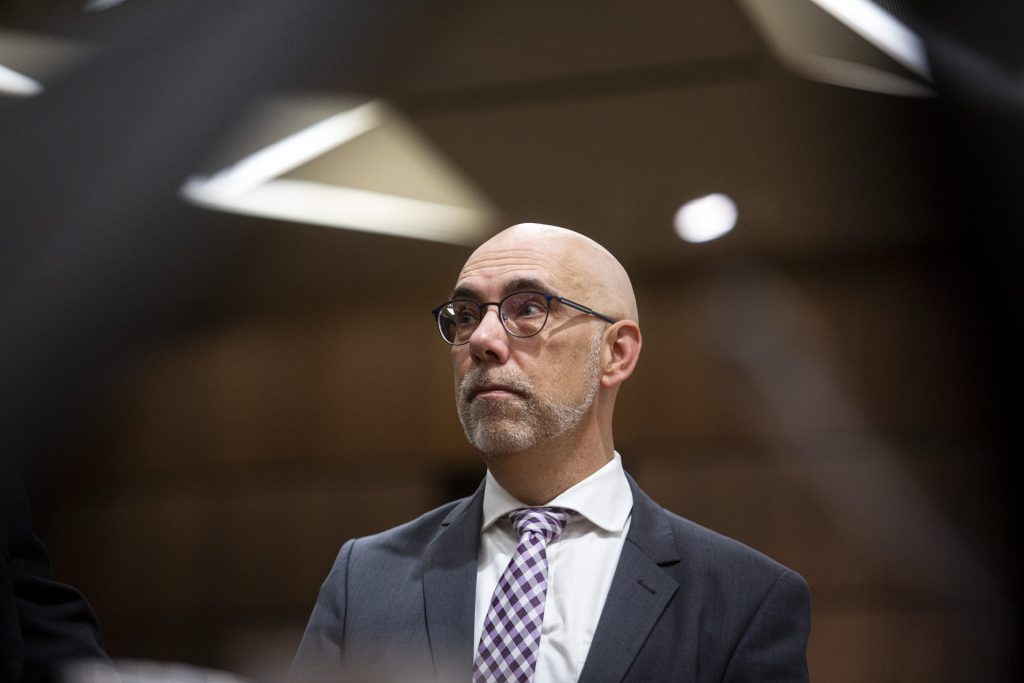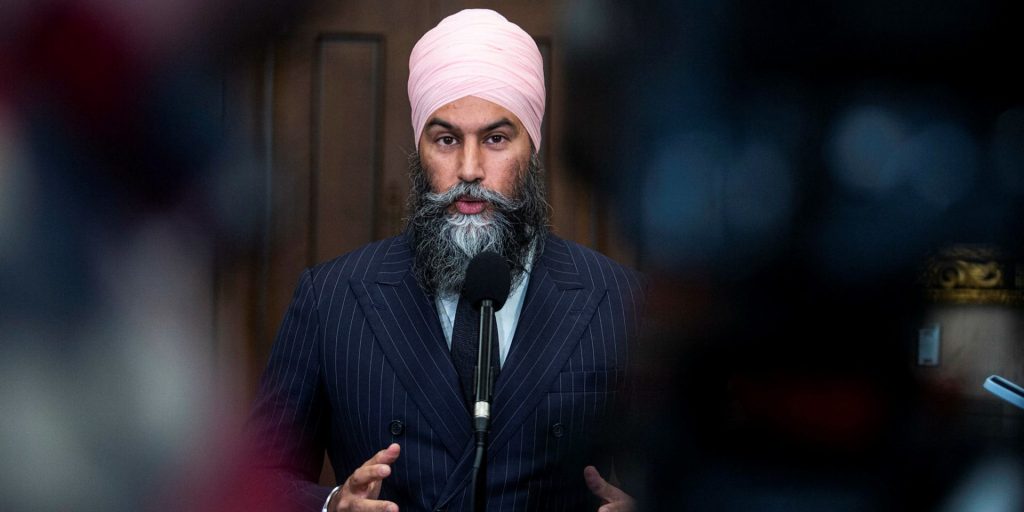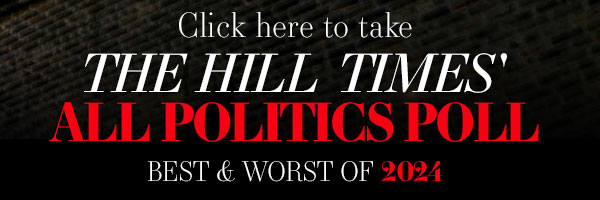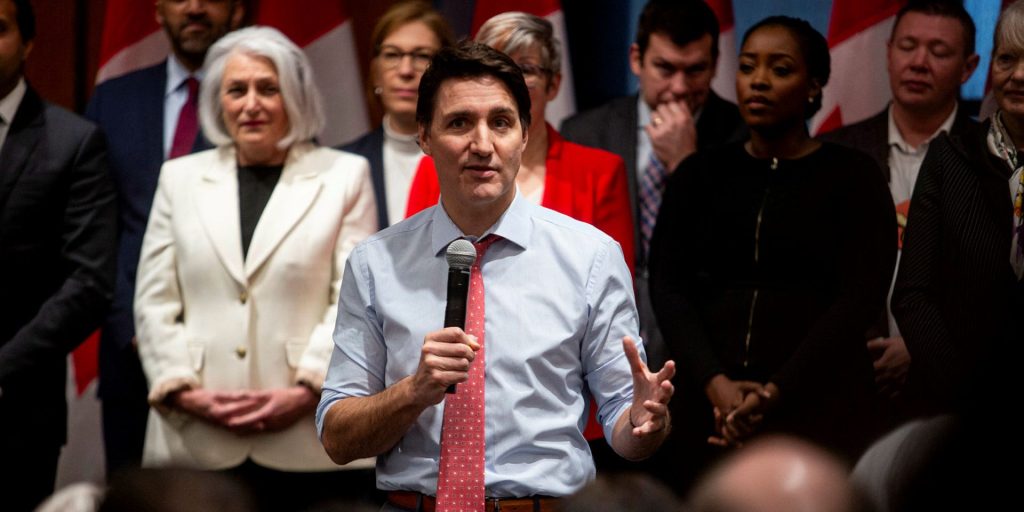New government spending request will be snared in parliamentary gridlock while privilege debate persists

The government has tabled its latest spending request in Parliament, but will have no way to pass a supply bill as long as the House remains gridlocked in a privilege debate now in its eighth week.
On Nov. 18, Treasury Board President Anita Anand (Oakville, Ont.) tabled the supplementary estimates B, asking Parliament to approve $21.6-billion in voted budgetary measures. They also contain $3.2-billion in budgetary statutory authorities, and $676-million in non-budgetary statutory authorities, which will not require a vote.
Parliamentary Budget Officer Yves Giroux told The Hill Times that departments have enough cash on hand to keep operating through the fall and winter even if the government cannot pass supplementary estimates, but it makes it “trickier for the government to be responsive to emerging situations that could come up.”
That’s because the main estimates, tabled by March 1 every year, provide the core funding for expected operations throughout the year, so departments already have the funds they need for core staffing and expected annual expenses.

Parliamentary approval of the estimates—not the vote on the annual budget implementation act—is required to release money from the consolidated revenue fund and into government departments, allowing them to carry out day-to-day activities like paying staff and running government programs.
“The mains are providing funding for core operations,” said Giroux. The supplementary estimates—typically three spread through the year—”are for new pressures, new programs that were not sufficiently finalized by the time the mains were being prepared.”
“If there’s no supps B ever, the government will not stop working,” he added. “But there might be some programs here and there that will have to take it easy, slow down, or stop operations at some point.”
Earlier this year, Parliament voted to approve the main and supplementary estimates A for a combined $202.8-billion in budgetary measures for 2024-25. These estimates also outlined $461.8-billion in statutory budgetary measures—spending that MPs don’t vote on because it is granted by laws that are already on the books. The estimates also contain non-budgetary measures, such as government loans and investments, that affect Ottawa’s fiscal position but not the surplus or deficit.
The latest estimates include spending requests for a number of items that are politically important for the government, such as $742.5-million for the Canada Mortgage and Housing Corporation to fund several of its housing programs.
Normally, Parliament approves the estimates as a routine matter—often with less scrutiny than is desirable, according to public finance experts.
However, with Parliament gridlocked by an ongoing privilege debate—over whether documents related to a now defunct government green-tech fund should be handed over to the RCMP for a criminal investigation—there is presently no way for the Liberals to gain approval for the portion of the new spending that must be voted on by Parliament.
The government can table the estimates document, as it did on Nov. 18, and committees can study them. However, the government will not be able to introduce the necessary supply bill needed to actually approve the spending until the privilege debate ends.
As the House of Commons financial procedures state, the estimates, “must be concurred in by the House in order for the government to introduce the appropriation bill authorizing the necessary withdrawals from the Consolidated Revenue Fund."
In order to obtain that concurrence, the House would have to get to the Government Orders on the daily agenda, something which is not possible as long as the privilege debate continues.
Ending the debate would require the government to obtain support from one of the opposition parties. The Conservatives and Bloc Québécois have made clear they want to bring down the government, making the NDP the most likely partner to help the Liberals out of the gridlock.
The NDP has not hinted at any immediate plans to either defeat the government or end the privilege debate, keeping the House in limbo.

‘A screeching halt’
If Parliament remains gridlocked in the spring when it comes time to pass the next set of main estimates, then “everything grinds to a screeching halt,” said Giroux.
The Hill Times asked Anand’s office if it was concerned not passing a supply bill could affect government operations or the Liberals’ ability to deliver on political and policy priorities.
In an email, a spokesperson for Anand’s office put the onus on the Conservatives.
“Our government is committed to getting things done for Canadians in Parliament, yet the Conservatives continue to filibuster and put their own partisan self-interest ahead of their responsibilities,” said the statement.
The current estimates include “new and necessary supports that require Parliament’s approval” such as funding for “affordable housing, meals for kids, dental care, and supports for youth,” said the statement. “The Conservatives need to stop playing partisan games.”

Without estimates, government cannot ‘quickly respond’ to new events
In the short term, there are a few workarounds departments can use to address some gaps if the supplementary estimates remain caught in the gridlock.
For example, large departments that are funded for multiple programs can move money between those programs, said Giroux, as long as the money is being used for the same purpose, such as salary.
“So if you have salary dollars … they can easily reallocate,” he said, “provided it doesn't mean firing people, but they can reallocate between two programs.”
He said departments may also practice what he calls “cash managing.”
This means departments can “take the risk of exhausting their allocations” on the expectations that eventually a supply bill will be approved—especially for “non-controversial” programs that are likely to receive political support in the House when a vote on the allocations can proceed.

“But there are limits to how aggressively they can cash manage,” said Giroux. “You can't cash manage for billions and billions, but you can probably take your chance for a few million.”
“It's a bit like somebody exhausting or driving their bank account to zero, knowing they'll get paid in two weeks, and if there's a delay a couple of days, ‘yeah, we’ll be in a bit of trouble, but it's a couple of days where we'll tighten our belt,’” he explained. “But that works only if what they they're seeking in subsidy is not immense amounts of money.”
A major political downside to the government in these circumstances, is that it cannot “quickly respond to big asks” if new events arise that require action, he said.
One other short-term option at the government’s disposal is to use a reserve fund held by Treasury Board that can be allocated directly to departments. However, Giroux said that fund is designed to respond quickly to emergencies—for example, if a government building burned down—and is not large enough to fund major programs. It’s also not intended to be used for policy-setting initiatives.
“The intent behind that way of proceeding is to not circumvent Parliament's authority to authorize spending for initiatives,” he said.
A statement from a spokesperson at the Treasury Board Secretariat offered a similar view.
“In the event the supply bill is delayed in Parliament ... departments requesting this funding would need to make decisions on a case-by-case basis," said the statement. "This could include delaying new programing, using existing funding, or requesting contingency funding from Treasury Board, which is used to provide urgent resources when other funding is unavailable."
'They can probably ride this out until early March'
The government does not have the option of funding departments through Governor General special warrants which can be used during election campaigns to support essential operations—and it does not gain that option even if it prorogues. That’s because in 1997, then-Liberal MP Peter Milliken—who went on to become the longest serving Speaker in House of Commons history—sponsored a private member’s bill to limit their use to dissolution periods, ending the practice of using them any time the House was not in session.

Giroux noted that even if the situation drags on until the spring, and the main estimates become caught in the gridlock, statutory programs like Old Age Security, the Canada Pension Plan, and Employment Insurance would still be funded because the authorities for these are already on the books.
But the public servants who operate these programs would no longer have a pay cheque to administer them.
“There wouldn't be anybody who'd be paid to send the checks or activate the switch for these direct payments,” said Giroux.
“They can probably ride this out until early March. But beyond that, it will put at high risk the functioning of the federal civil service.”
icampbell@hilltimes.com
The Hill Times






 LICENSING
LICENSING PODCAST
PODCAST ALERTS
ALERTS













